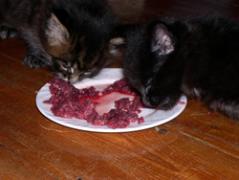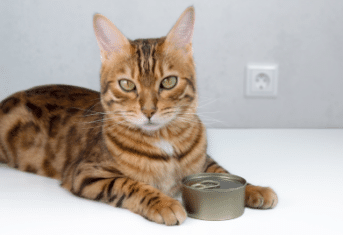Preventing Foodborne Infections in Pets

Preventing Foodborne Infections in Pets
Foodborne illness has been in the news all week. First, the massive multi-country European outbreak of E. coli has sickened over 1,000 people and killed more than 20.
Closer to home, the United States Food and Drug Administration notified consumers of multiple recalls due to possible salmonella contamination in pig ear treats and a raw diet for cats. This type of news has veterinarians, including us at The Animal Medical Center on alert for illness possibly related to food.
Food and water can become contaminated with salmonella and E. coli bacteria if they come in contact with fecal material or if the processing plant is contaminated. Cooking readily destroys both of these bacteria. Neither of the recalled pet products was cooked. One was a diet designed to be fed raw, and pig ears are frozen and dried, but not cooked.
Both salmonella and E. coli are enteric bacteria and are commonly spread when contaminated food and water are ingested. Ingestion of salmonella or E. coli contaminated food or water can result in gastroenteritis, fever and abdominal pain in both humans and pets.
How can pet owners protect their pets and themselves? The June 1 issue of the Journal of the American Veterinary Medical Association offers suggestions on safe feeding practices. I have summarized them here.
- Avoid feeding raw food diets.
- Avoid purchasing bulk pig ears, buy individual packets.
- Return pet food to store if it is discolored or has a bad smell.
- Store pet food according to the manufacturer’s recommendations.
- Save packaging and product codes for pet food to facilitate identification of a recalled food.
- Children, the elderly and immunosuppressed humans should not handle pet food and treats.
- Wash hands with soap and water before and after handling pet food and treats.
- Wash pet water and food bowls regularly.
- Keep human and pet foods separate.
- Discourage humans from eating pet foods and treats.
________________________________________________________
This may also be found in the “Tales from the Pet Clinic” blog on WebMD.com.
For over a century, The Animal Medical Center has been a national leader in animal health care, known for its expertise, innovation and success in providing routine, specialty and emergency medical care for companion animals. Thanks in part to the enduring generosity of donors, The AMC is also known for its outstanding teaching, research and compassionate community funds. Please help us to continue these efforts. Send your contribution to: The Animal Medical Center, 510 East 62nd Street, New York, NY 10065. For more information, visit www.amcny.org. To make an appointment, please call 212.838.7053.


































